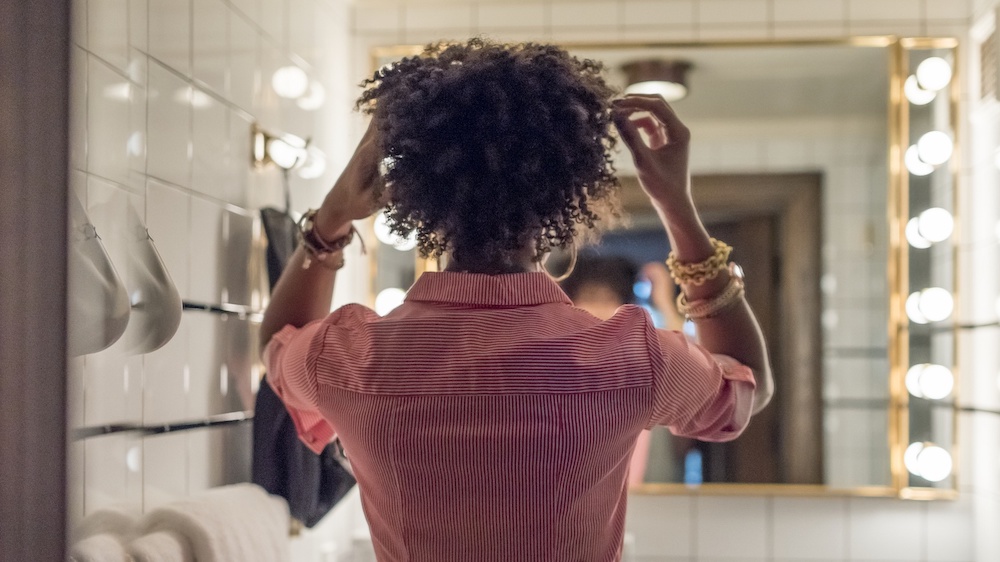If you’re interested in sharing your opinion on any cultural, political or personal topic, create an account here and check out our how-to post to learn more.
____
There was no regret in buzzing my 4C head of hair in September of 2021, during an episode of revolving grief, a possible occurrence of premenstrual dysphoric disorder (PMDD) or the existential dread from the entire planet being in crisis. It was nearly 2 a.m. and I was live on Instagram in the bathroom of my Echo Park apartment — with about a dozen followers questioning my mental stability as the hum of the razor made its way towards the nape of my neck. I'd enjoy being bald for maybe a month, an instant f*** you to the patriarchy and the labor of femininity.

I experimented by chopping up beauty supply wigs into mullets via YouTube tutorials, but even the Rihanna cosplay wasn't doing it for me. I was sincerely sick of giving the dead cells on my head so much power. If my edges weren't laid, then apparently nothing else in my life was aligned. If I didn't take the 90 minutes every three days to properly melt some lace into my forehead it was a direct correlation of how Black I am. This shame is only magnified by choosing a career in a predominantly white apparatus such as Hollywood, observed by its most prominent critics, Black Twitter.
Today, the internet is a breeding ground for beauty politics. In the age of influence and hyper-consumerism, perceived value determines our monetary conditions and value of life. We are talking about a multibillion-dollar beauty industry, utilizing your favorite influencers and celebs as mascots to further incentivize and commodify rituals that "fix" and "enhance” socially desirable traits for proximity to whiteness and/or backdrops of perceived wealth.
If the Black woman is deemed attractive, she likely possesses characteristics that appease colorist, featurist and texturist ideals — words and definitions in which academia has failed to recognize, and affirm/prove that Black women choosing to exist without any decoration is the rival of desirability. In the book Belly of the Beast: The Politics of Anti-Fatness as Anti-Blackness, by Da'Shaun L. Harrison, “prettiness,” is presented as a set of structural advantages over someone who is “ugly.” It’s a set of beauty standards steeped in anti-blackness, anti-fatness and ableism made famous by white supremacy. I fear no man, but I fear those whose gaze is blurred by the patriarchal lens, as they are usually gatekeepers in media. The retrieval of "the bag" is contingent upon my desirability.
I'm here to speak on the helplessness of it all, the labor Black women endure behind the cameras and desks. What does it mean when historical Black figures are glamorized for the consumption of Hollywood? What does it mean when Zazie Beetz, a visibly light-skinned, biracial woman of German and Afro-American descent, is cast to play the role of Stagecoach Mary, a Black woman who once existed as a tall, darker-skinned, plus-sized femme from our own history books? What does that erasure symbolize? Why is our questioning met with gaslighting and projections of jealousy and bitterness, when the genuine concern is the violence and erasure? We are satisfied with similar responses on the conversation of Blackfishing, a term coined by journalist Wanna Thompson on how our Blackness is used for costuming sexual desirability as a marketing strategy for non-black women to cash out on racial ambiguity.
Can we start a thread and post all of the white girls cosplaying as black women on Instagram? Let’s air them out because this is ALARMING.
— Wanna (@WannasWorld) November 7, 2018
Casting directors are not exempt from the critique of these "-isms," as Netflix allegedly seems to give power to the brown paper bag method for nearly every film or series that makes it to production. Take a second to observe how dark-skinned femmes are desired on-screen, who they prefer and why many casting breakdowns that are specifically for dark-skinned femmes happen to be for queer characters who are sprinkled with traits of masculinity.
I spent most of my childhood haunted by Just For Me adverts, with flakes of dried "dookie gel" sprinkling my forehead, ear lobes pressed into my lymph nodes to avoid a hot comb incident, the overwhelming smell of pink lotion, blue magic grease, hair spritz and a mother who only knew how to bump ends or make fat, twisted ponytails that were frizzy by the end of the school day. Schools serve as sites for the contribution of race, class and gender identities; they also reproduce existing inequalities in these areas. Good hair was the only means of survival, and I died a few hundred deaths drowning in the genetic pool of dark skin and nappy hair. I've dug myself out of these graves for years now, patching up the salted wounds that bloodied my self-esteem.
Seeking punishment against others is embedded in our social culture, and black femmes are the easiest targets because we have the least protection. When beauty equals worth, harm will inevitably happen to us.
____
Samantha Marie Ware, also known by her singer stage name Sameya, is an American actress and singer. She is best known for portraying Jane Hayward in the sixth season of 'Glee,' as well as Angela Archer in the Netflix series 'What/If.' (via Wikipedia)
